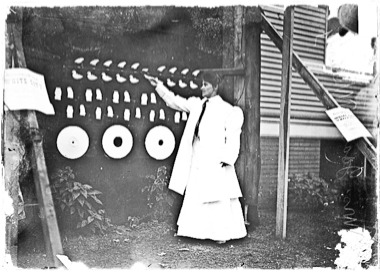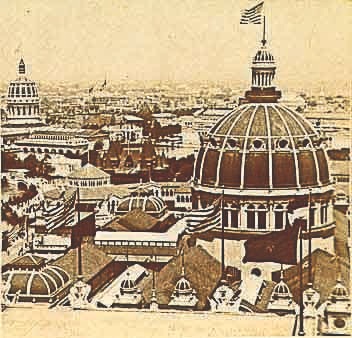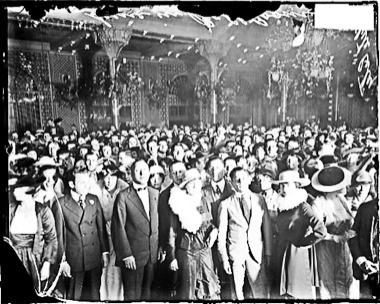When Joe Di Cola was four years old, his father would take him to Jackson Park in Chicago – the site of the 1893 Chicago World’s Fair – to teach him the history and interesting details about the fair.
Somewhere around that age, something sparked inside Di Cola: seeing the original architecture from the fair – what is now the Museum of Science and Industry – Christopher Columbus’ replica ships constructed and stationed in the Jackson Park Harbor (“I actually thought it was the Santa Maria for the longest time,” Di Cola recalls), and the Statue of the Republic created an itch to learn more about the fair.
Years later, that itch has grown into a full passion and until recently only served as a hobby. However, in the past two years, Di Cola has worked side-by-side with David Stone and Arcadia Publishing to create an addition to the “Images of America” series, all about the Chicago World’s Fair.
“The fair was mentioned in a few of these books, but no one really talked about the history of the fair. It only really came up here or there. So I wanted to try to do something about it,” Di Cola said. “Originally, I wanted to do something just about the replica ships built for the fair, but they told me it was too restrictive and instead suggested the fair as a whole.”
That’s when the publishers hooked him up with Stone, who had previously penned a book for their series about the architecture of Chicago.

Contact started between the two in January 2011, when Di Cola and Stone discussed how they wanted the book to look and what content they wanted to include. The first proposal was accepted later that spring and the two began work in the summer.
The final proposal was submitted and approved last month, and the book, “Images of America: Chicago’s 1893 World’s Fair,” was officially released on October 6.
“I’m glad I did it. I feel good about this because it gave me a chance to take all those years of work and do something,” Di Cola said. “It brings some closure. I can say, ‘Hey, it really happened.’ And it’s affirming to have this physical copy for all the work that went into it.”
Though he no longer lives in Chicago – Di Cola moved from Sun City “a while back” to Troy, Ohio to follow his family – he still remains attached.
“When we were working on this book, I would make trips to come to the city to gather what information I could. I still have a lot of friends in the area, and I live close enough to Chicago where I could make a weekend out of it,” Di Cola said, mentioning that those trips to Chicago sometimes ended in disappointment due to the difficulty of finding all the information surrounding the fair.

“One of the hardest things is to get access to photos that came out after the Civil War, trying to call out those images that are older than 100 years, because they may have some public domain issues and working with some archives could be more difficult than working with others. We had to find the images that had clarity, that could best represent the fair,” Di Cola said.
Luckily, he was able to rely on the kindness of strangers to get some more unique imagery into the book.
“There would be people who would serendipitously find out that we were making this book and would dig through their archives to find a photo and give it to us,” he said. “It was such luck that we were able to get our hands on it.”
As Di Cola continuously stated, prior to the creation of the book, he had “drawers full” of information surrounding the fair.
“I was very confident. I was trying to learn about the fair before, and I found many resources that I would keep track of. And when Arcadia suggested the overall fair, that’s where all of the information came from. For all of the work I’ve done over the years, it’s really paid off,” Di Cola said.
A self-described fan of Arcadia’s imagery series – Di Cola has at least a dozen books in his library – he is most looking forward to the ability to share that information with others.
While he has received three copies so far, he already distributed them to his three grandchildren, who are 11, 10, and 2.
“I thought they should have them. I did dedicate the book to them, but I do hope they become interested in history as well and are able to see that there’s so much fun stuff out there. As a former educator, I don’t see a lot of interest in history anymore, because people often lop it under the boring title of ‘social studies’. It’s just a sad thing,” Di Cola said.
Any money earned from these books will benefit his grandchildren, as well.

“I really hope people who have an interest get it off the shelf and give it a try. I’m not interested in making any money. I’m giving it all to my grandsons. I’m really looking forward to doing something else and keeping busy. It was fun to do. I never got discouraged, and I look forward to maybe doing it again,” Di Cola said.
The book is currently available at any Barnes & Noble Booksellers or online at amazon.com or Arcadia’s website. Di Cola said he plans to head back to the city around Thanksgiving for a possible book signing at Read Between the Lynes, based in Woodstock, but may schedule additional appearances between then.
Until that point, he’s actively looking into the history of Ohio.
“There’s a big flood that happened in the 1910’s that’s sparking some interest, and I may just look into it. And we had this big canal system that operated in the Ohio area before the railroads came in. It’s always interesting to learn about the new area where I live.”





